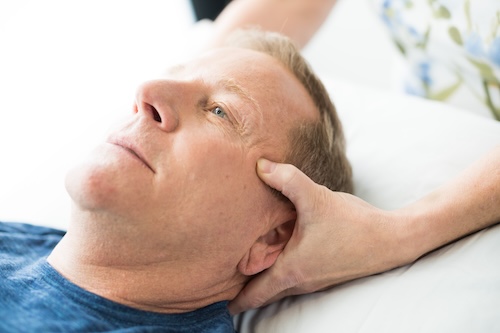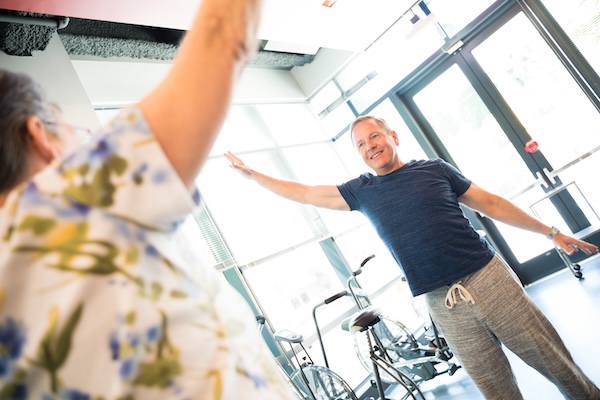Cancer Rehabilitation

Our physical, occupational and speech-language therapists work together to help cancer patients manage symptoms and side effects during and after treatment. You’ll find:
- Innovative strategies for managing cancer-related pain.
- Expert care for lymphedema, nerve pain (peripheral neuropathy) and other cancer-related conditions.
- A facial rehabilitation specialist for head-and-neck cancer patients.
- Programs to prepare you for surgery, radiation therapy or chemotherapy.
- Pelvic floor rehabilitation for men and women.
What is cancer rehabilitation?
Cancer and cancer treatment can affect your ability to move, think, work and enjoy life. Whether you’ve just been diagnosed or have finished treatment, our cancer rehabilitation specialists can help you regain abilities and reduce pain. We work closely with your cancer doctors, nurses and social workers to provide complete care.
Conditions we can help with
Balance problems: Dizziness and difficulty balancing are common for cancer patients. Our therapists can improve your stability and perception. They can also recommend walking aids if needed.
“Chemo brain”: After chemotherapy (and sometimes after surgery or radiation therapy), you may notice trouble with memory, concentration and finding the right word. Our speech-language therapists will give you tools and strategies to help. We’ll start with an assessment of your cognitive (thinking) skills so we can track your progress.

Facial weakness: Head and neck cancers and their treatment can damage nerves that affect your ability to smile, close your eyes, talk and eat. Our facial rehabilitation specialist can help you restore function and reduce pain.
Fatigue: Cancer and cancer treatment can make you very tired. OHSU research shows that exercise can help. Our therapists can tailor an exercise program to your needs and teach you how to reduce stress, pace yourself and conserve energy.
Incontinence: Our expert pelvic floor physical therapists can help with exercises and other ways to regain bladder and bowel control.
Lack of mobility: Our cancer rehabilitation team offers strategies to help you regain your mobility. These might include range-of-motion and strength-training exercises as well as ways to manage pain.
Lymphedema: Lymph nodes are bean-size structures that circulate and filter fluid as part of the immune system. They may be removed in cancer surgery or damaged by radiation therapy or chemotherapy. This can lead to fluid buildup, causing swelling and pain. Our occupational and physical therapists can help you recognize lymphedema and manage it with massage, compression garments and exercise.
Nerve pain (peripheral neuropathy): Chemotherapy, surgery and radiation therapy can damage nerves. This can leave weakness, numbness and pain, especially in your hands and feet. It can also affect balance and coordination. Our physical and occupational therapists can help you recognize early signs of peripheral neuropathy. They can teach you how to lessen its effects, and they can help improve your safety and mobility.
Pain: You’ll learn relaxation exercises to help you manage pain and reduce the need for medication. We also use skilled massage, manipulation techniques and electrical currents to relieve your pain.
Palliative care: We work closely with OHSU’s Palliative Care Service to help you boost function and relieve symptoms, especially with late-stage cancer.
Preparing for chemotherapy and radiation therapy: Regular exercise can also reduce side effects from these cancer treatments. We’ll help you develop an effective exercise routine.
Preparing for surgery: Research shows that people have fewer complications and faster recovery if they’re in the best shape possible before surgery. We’ll help you with an exercise program that might include aerobic training, and strength and balance exercises. We’ll also teach you how to move, breathe and cough correctly after surgery.
Weakness: Long periods of bed rest can weaken muscles. Our therapists will develop an exercise program that can include helping you adjust to using a cane, brace or walker if needed.

Other OHSU services
- Life after cancer: Learn about our survivorship services, which can help you transition from treatment to long-term care.
- Cancer registries: Learn about our cancer registries, which offer the chance to help research and to stay up to date on discoveries.
- Resources: Find a wide range of services and resources for OHSU cancer patients and their families.
Learn more
- Rehabilitation, American Society of Clinical Oncology
- Rehabilitation, American Cancer Society
- Side Effects of Cancer Treatment, National Cancer Institute
- Lymphedema, National Cancer Institute
- Nerve Problems (Peripheral Neuropathy) and Cancer Treatment, National Cancer Institute
Locations
See OHSU Health rehabilitation locations across the Portland area.
Refer a patient
- Refer your patient to OHSU.
- Call 503-494-4567 to seek provider-to-provider advice.